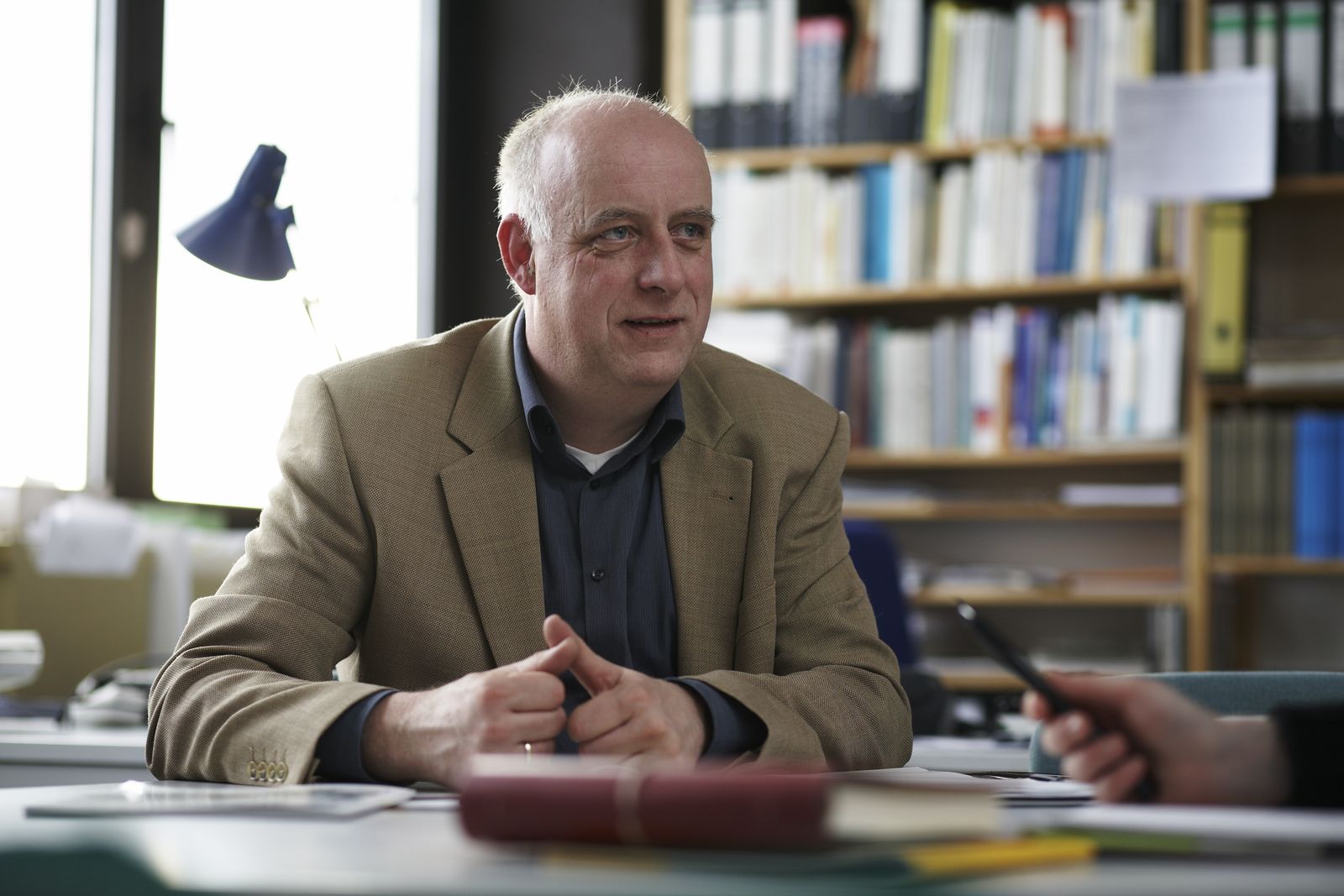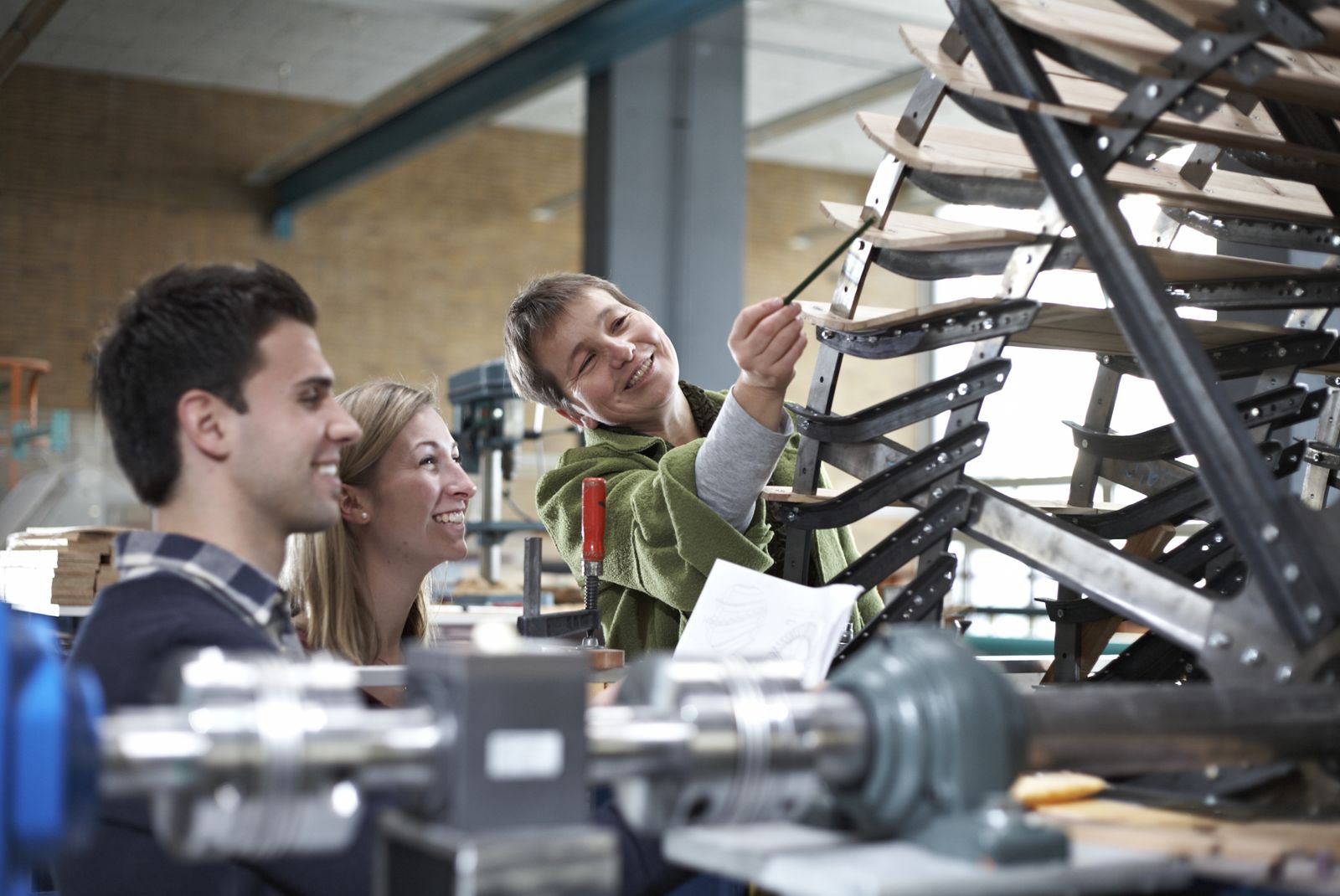Dr. rer. sust.: Doctoring Sustainability

Graduates of Darmstadt University of Applied Sciences are now able to take a brand-new and quite special doctorate: as of this current semester, the newly-founded PhD Centre for Sustainability Sciences is paving the way for ‘Doctor of Sustainability Science’ courses – a title currently unique throughout Germany. In March, Hesse’s new state Minister for Science, Angela Dorn, gave the go ahead for the PhD Centre, which has thus become the University’s first independent PhD Centre.
By Christina Janssen, 28.6.2019
The centre addresses what scientists habitually refer to as ‘wicked problems’ – the truly major challenges. That classic example: climate change. Solving such intricate problems requires the combined input of many smart thinkers from a variety of disciplines acting in concert. To this end, a total of 16 professors work at the PhD Centre for Sustainability Sciences, bringing such varied fields as Plastics Technology, Mechanical Engineering, Construction and Environmental Engineering, Electrical Engineering, Chemical and Biotechnology together with researchers from Social Sciences, Economics, the Humanities and Communication Sciences under one roof. As Professor Dr. Arnd Steinmetz, Vice-president for Research and Scientific Infrastructure at the h_da states: “this degree of interdisciplinary collaboration exemplifies what we as a University for Applied Sciences stand for – practically-oriented research of complex, real-world problems.”
The challenges posed by interdisciplinary communication

But first, a real-world hurdle needs to be scaled, for interdisciplinary collaboration inherently entails participants employing different vocabularies. When asked about the term Sustainability Sciences, Sociologist Prof. Dr. Bernd Steffensen begins with the United Nations’ bio-diversity report, to explain how non-sustainable daily routines can be over-turned by a combination of new technologies and these becoming socially embedded. By contrast, Civil Engineer Prof. Dr. Nicole Saenger states briefly that the primary goal is to develop creative, real-world practicable solutions so that future generations will also be granted an opportunity to live a good life on Earth.
Steffensen was appointed head of the new PhD Centre by the h_da Executive Board, whilst Saenger was appointed deputy head at the constituent assembly held in May, meaning it may well be possible that soon they could be cooperating to supervise the first graduates to join the Centre. Frau Saenger is the first to admit that “of course interdisciplinary communication is a tad cumbersome at first, for each uses their own established vocabulary and ways to communicate – meaning a few misunderstandings are practically unavoidable.” Yet instead of feeling anxious about an encroaching Babylonian confusion of tongues, both Saenger and Steffensen are clearly looking forward to working together on projects. “We’re quite a mixed crowd” grins Sociologist Steffensen, “yet we’re definitely united by the crucial insight that the really big problems of our times can only be approached and solved when we combine the disciplines to collaborate and work together.”
What has been established at the PhD Centre is that the next generation of scientists will be supervised by an interdisciplinary team – with an Engineer or Natural Scientist supervisor and a Humanities Scientist supervisor each – in order to gravitate towards what is termed ‘social shaping of technology’. This refers to a three pillar model comprising sustainability, plus an efficient and equal balancing of economic with ecological and social objectives.
Covering a wide range of issues
A glance into the non-too distant future: for example, Sociologist Steffensen and Civil Engineer Saenger jointly supervise a PhD student regarding a water resources management issue. It’s quite clear that different sets of thoughts enter each of their minds when they spy a water wheel. “Hmm, which shape blade would be most appropriate here?“, ruminates Prof. Saenger. “Might it be feasible to re-activate at least some of the old mills scattered around the Odenwald?“, spirals through Prof. Steffensen’s mind. Civil Engineer Saenger considers a couple of steps further, thinking of other engineering aspects which could play a role: “how do the varying flow rates between the blades themselves affect output; which type of wheel is most suited to being installed in a canal, and what is the most effective method of generating yield from minor incremental steps?” The Social Sciences part of the dissertation would then address issues such as which business models would be most appropriate; what the overall ecological balance is for water wheels as well as the question whether the community as a whole was in favour of supporting a hydraulic power project. “A PhD student with an engineering background might then find it necessary to instigate a survey within a village in the Odenwald on this issue. They should also consider ethical aspects and estimates of the impact any technology being introduced may have” explains Steffensen, “whilst from the opposite direction, a PhD student with a Humanities background would need to acquire the requisite technological fundamentals.“
The staff members of the PhD Centre have already compiled quite a long list of topics and issues: these include renewable energy sources, alternative forms of mobility, research into new materials – for instance in nano or bio areas – optimization of energy streaming in heating technology or the optimization of construction techniques to save resources in lightweight engineering. All of these specialist competencies and more are being integrated within the new PhD Centre. In the opinion of vice-president Prof. Arnd Steinmetz pooling them together is only consequential: “The issue of Sustainable Development has become firmly established at our University over the past few years, especially via the research centres ‘Sustainable Processes and Techniques’ as well as ‘Material and Process Technology’, the transfer project ‘s:ne’ or the study courses that focus on sustainability, such as ‘Energy Sector’, ‘Building Systems Technology’, ‘Environmental Engineering’ or ‘Risk Assessment and Sustainability Management’. The new PhD Centre for Sustainability Sciences will now enable us to cast an efficient net over the issues posed by all of these various interdisciplinary research fields.”
The overall aim is less the development of theories than practice-oriented problem-solving within an interdisciplinary team. The next generation of scientists will therefore be confronted with rather demanding tasks. In order to become a bona fida ‘Doctor of Sustainability Science’, a post-graduate must be able to adopt a broader view beyond their own specialist discipline, be innately curious and versatile. Although Professor Saenger is quite certain that “our candidates will find precisely these aspects highly appealing.”
Doctor title as a Unique Selling Point
The first post-graduates have already expressed their interest and enquired about application procedures: the best way is to contact either the administration or management of the PhD Centre itself (see Contact details and the Link below). The next step is to work out a synopsis outlining the aims of the applicant’s dissertation. The PhD Committee then decides whether the proposition is conceptually sound and it attains a sufficient standard, whereby in a procedural context the PhD Centre is essentially oriented towards English-speaking precedents – as the PhD Committee corresponds to a standard Academic Board. If there is any doubt in the suitability of a proposition, the synopsis may be referred for additional external appraisal. As Steffensen notes “we aren’t after a ‘Boulevard of Broken Dreams’, but rather taking on candidates with genuine prospects of being successful”. By the way, the PhD Centre isn’t a closed society – professors who are not currently members are welcome to join as second or third level supervisors.
The whole project is undoubtedly ambitious, and to date hardly any similarly comprehensively-oriented study programmes have been established in Germany. The trailblazer is the Leuphana University in Lüneburg where an independent Sustainability Faculty was first established. However, the ‘Doctor of Sustainability Sciences’ at the h_da is still, for the time being, a unique selling point. It is planned for the PhD Centre to be evaluated in five years time, so what must be achieved in order for the project to be attested a sound bill of health? In this regard both sociologists and engineers speak the same language: both Saenger and Steffensen point to working out collective methods and topics, establishing joint team meetings, publications and conference papers and then, of course – to be able to present a whole range of dissertations that are well on the way.
Support via in-house grants
One way that the Darmstadt University of Applied Sciences could position itself with the PhD Centre for Sustainability Sciences, also in the context of primary educational policies, is as a place where the future is being designed. As Professor Saenger points out “our students are used to finding an overview of situations, of seeing things that aren’t in the textbooks.” She is certain the school pupils currently participating in the Fridays-for-future demonstrations will soon be queuing up to study, bringing their hunger for sustainability issues into the universities with them, “we were already well-prepared, as developments over the past few years have established a sound foundations – to which the PhD Centre now adds a very important additional building block.”
The only possible sticking-point according to Professor Saenger involves financing of the post-graduate positions: “engineers who have completed their studies can find very good, well paid positions and we simply cannot compete with these in financial terms.” The h_da is therefore supporting the establishment of the PhD Centre by way of a h_da in-house doctoral grant programme for promising candidates. Perhaps the prospect of becoming a ‘Doctor of Sustainability Sciences’ will be reward enough for some young people, for whom the effort will also hopefully pay sustainable dividends in many, many respects.
Author
Christina Janssen
June 2019
Contact details
Administration PhD Centre
Dr. Janina Fengel
Tel.: +49.6151.16-39458
E-Mail: janina.fengel@h-da.de
Graphics
Dubbel Späth (Ico Maker, Iconic Bestiary / Shutterstock.com)
